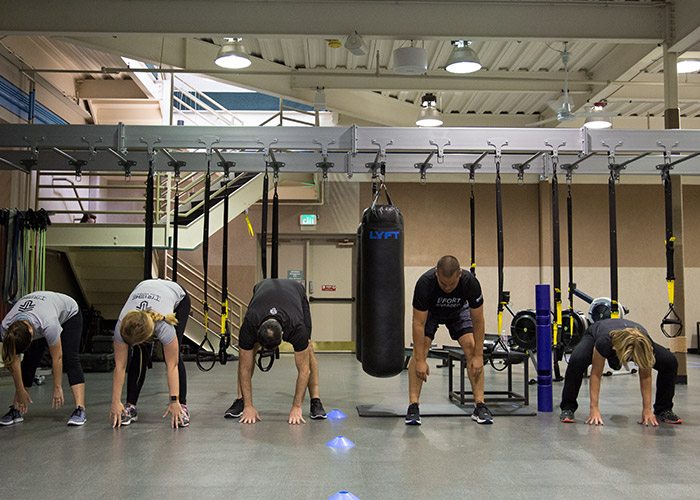Part I: High Blood Pressure - What Does It Mean for Your Health?
When’s the last time you had your blood pressure checked? For many of us, it was quite recently as blood pressure checks are a routine part of a visit to our physician’s office. But, do you know what your blood pressure numbers mean? Do you know how blood pressure affects your health?
March is all about heart health at Myzone, and we want to help you better understand how high blood pressure can affect your health and what you can do about it.
Definition of Blood Pressure and Guidelines
Your blood pressure is the pressure of your blood in your circulatory system. Blood pressure is recorded as systolic blood pressure over diastolic blood pressure. Systolic blood pressure indicates how much pressure your blood exerts against your artery walls when your heart beats, whereas diastolic blood pressure indicates how much pressure your blood is exerting against your artery walls while your heart is resting between beats. Normal blood pressure is categorized as a systolic reading below 120 mmHg and a diastolic reading below 80 mmHg.
Generally, more emphasis is placed on elevated systolic blood pressure as a risk factor for cardiovascular disease; however, elevated systolic or diastolic blood pressure alone can be used to make a diagnosis of high blood pressure or hypertension.
The American College of Cardiology and the American Heart Association put out new high blood pressure guidelines in 2017 that lower the definition of hypertension. Please see the new guidelines below.

Negative Health Effects of High Blood Pressure (Hypertension)
High blood pressure has negative health implications beyond heart disease. In Part I of this two-part blog post, we’ll share how hypertension negatively affects the health of multiple systems within your body. In Part II, we’ll wrap up the negative effects of hypertension and conclude with a final section offering suggestions for addressing high blood pressure.
Arteries and Heart
Most obvious on the list of negative health effects caused by hypertension are damage to your arteries and heart. Hypertension increases the pressure of blood flowing through your arteries and can cause damaged and narrowed arteries and aneurysm.
Damaged/narrowed arteries: Hypertension causes damage to the cells of your arteries’ inner lining and causes them to become less elastic which limits blood flow throughout your body.
Aneurysm: Pressure from blood moving through a weakened artery can cause a wall section to enlarge and form a bulge known as an aneurysm. Aneurysms can form in any artery throughout your body, but are most common in your aorta (largest artery in your body). A ruptured aneurysm can cause life-threatening internal bleeding.
Uncontrolled blood pressure can damage your heart by contributing to coronary artery disease, an enlarged left heart, and heart failure.
Coronary artery disease: Narrowing of the blood vessels that supply blood to your heart.
Enlarged left heart: High blood pressure causes your heart to work harder than necessary to pump blood throughout your body. Your left ventricle begins to thicken as a result and this limits its ability to pump blood to the rest of the body. Risk of heart attack and heart failure increase with this condition.
Heart failure: Strain on your heart caused by high blood pressure causes your heart muscle to weaken and it begins to wear out and fail.
Brain
Hypertension can also cause damage to your brain including transient ischemic attack (TIA), stroke, and dementia.
TIA: a TIA is a short, intermittent disruption of blood supply to your brain often caused by thickening of the arteries or a blood clot.
Stroke: more severe than a TIA, a stroke occurs when a part of your brain is without oxygen and nutrients causing brain cells to die. This can be caused by narrow, leaking, or ruptured blood vessels or blood clots.
Dementia: Vascular dementia can result from the narrowing and blockage of arteries that supply blood to the brain.
Keep moving forward!
Part II of this blog will cover negative effects of hypertension on the kidneys, eyes, and sexual organs and will conclude with action steps you can take to combat high blood pressure. The good news is coming!
Remember to use the hashtags #effortrewarded and #myzonemoves when you post your workout pics, and don’t forget to add your workout pics with your moves in your Activity Calendar!
For more tips on how to use the Myzone® heart rate monitor and App, follow us during Fitness Fridays on Facebook Live (subscribe on Myzone’s Facebook Page) – 8 am PT, 11 am ET, and check out our Myzone® Moves Podcast on iTunes or Google Play.
Share this
You May Also Like
These Related Stories

Part II: High Blood Pressure - What Does It Mean for Your Health?

How to Use the Myzone System for Weight Loss





